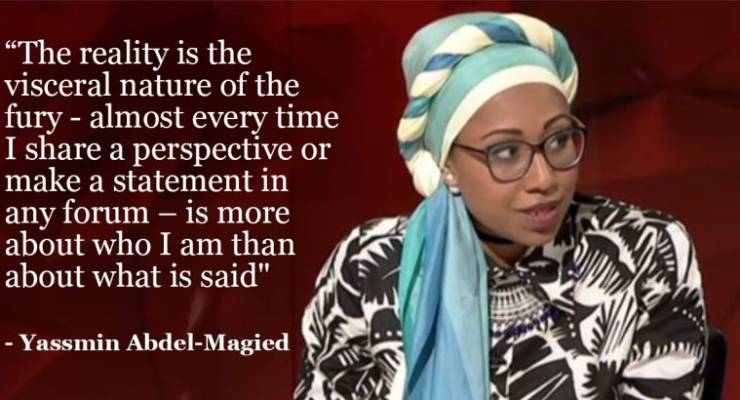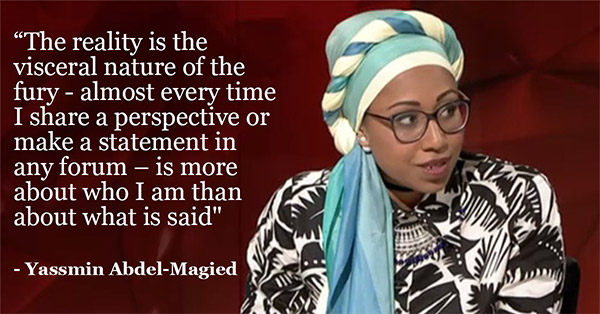
Yassmin Abdel-Magied describes herself as the “most publicly-hated Muslim in Australia” — thanks in no small part to a Holy War conducted against her by The Australian.
For someone who is a casual ABC presenter, engineer, writer, and activist, the paper’s coverage of her every move has been frenetic.

The first round of attacks was prompted by a comment from Abdel-Magied on the ABC’s Q&A in February saying that Islam was the most feminist religion. The Australian took offence, and turned Abdel-Magied into a fresh target. So, when she posted a statement on Facebook on Anzac Day saying: “Lest we forget (Manus, Nauru, Syria, Palestine)” (which she quickly deleted and apologised for) The Australian was off and running — almost 12,000 words have been written about her in the paper since that post.
The paper hounded the ABC about whether she would be sacked, covered her talk to students at a Sydney Writers’ Festival event, and launched a barrage of criticism against her July op-ed in Guardian Australia about her experience in the public eye.
As the Holy War against Abdel-Magied ramped up, it included a page-three story she had posted on Facebook about a discount code on glasses, and stories about a “taxpayer-funded” trip to the Middle East and her role on the Arab-Australia Council. Then came a front-page pointer when she announced she was moving to London. And, in early August, there was another page-three story dedicated to her quitting as chair of the Arab-Australia Council — reported as “losing her place” — because she was moving overseas. Most recently, yesterday, the Oz reloaded the guns, censuring Abdel-Magied, and dubbing her the “Queen of Bad Timing”, for comments she made on Twitter about the recent terror attack in New York.
“Whether or not one agrees with me isn’t really the point,” wrote Abdel-Magied in the Guardian Australia piece. “The reality is the visceral nature of the fury — almost every time I share a perspective or make a statement in any forum — is more about who I am than about what is said. We should be beyond that but we are not. Many, post-Anzac [Day this year], said the response wasn’t about me but about what I represent. Whether or not that is true, it has affected my life, deeply and personally.”
ON MONDAY, THE FINAL CHAPTER: How The Australian influences politics








Crikey is committed to hosting lively discussions. Help us keep the conversation useful, interesting and welcoming. We aim to publish comments quickly in the interest of promoting robust conversation, but we’re a small team and we deploy filters to protect against legal risk. Occasionally your comment may be held up while we review, but we’re working as fast as we can to keep the conversation rolling.
The Crikey comment section is members-only content. Please subscribe to leave a comment.
The Crikey comment section is members-only content. Please login to leave a comment.